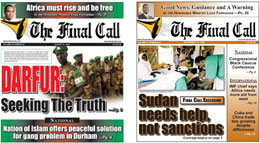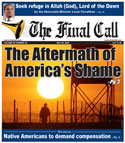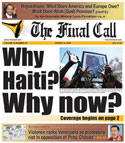FCNNEWSSOURCE

(FinalCall.com) – Since its founding by the Honorable Minister Louis Farrakhan, this newspaper has not only brought the Teachings and Program of the Most Honorable Elijah Muhammad into the homes of our readers, but The Final Call has served to highlight, in a manner done by no other Western newspaper, the struggle of Black people for freedom, justice and equality in this country and abroad.
As customary in newspapers at the close of each year, The Final Call looks at 2004 in retrospect and brings the following pages of a round-up of our coverage of stories of news, issues, people and the Nation of Islam that impacted our lives, using readers’ responses as a barometer.
The old year of 2004 saw The Final Call reach across America to bring piercing analysis, candid reports and inspiring features of vital interest in the struggle of freedom of people of color. The Final Call will work diligently throughout the new year of 2005 to continue to expand our coverage with a wider circulation made possible by the Divine Mission of the Honorable Minister Louis Farrakhan.

A report from Darfur
Although media hounds were dripping with blood when it came to coverage of the Khartoum government in the Sudan as it related to the fighting in the Darfur region of the country, The Final Call found that many of the news stories were bloated beyond recognition. Traveling as part of a fact-finding delegation in September, we saw a humanitarian crisis that we could not label “genocide” even as Bush officials were urging Congress and the United Nations to conclude.
The most salient evidence to dispel the flames stoked by propaganda was the fact that all of the tribes in the Darfur region are Muslim, although Western media was depicting the fighting as Islamic aggression. There were no religious undertones to the conflict, only a battle to control abundant resources. The conflict was also not ethnic–although Western media busied itself perpetuating the lie that light-skinned Arabs were slaughtering African Blacks and thereby placing the conflict within the racial hotpot within which this country’s political landscape is often submerged. The Sudanese people are undeniably suffering and humanity still needs to properly answer their call for help.

The Iraq war
By every way of measuring the situation, the United States was far worse-off Jan. 1, 2005 in Iraq than one year earlier. There were even more deaths of U.S. service personnel and civilians members of the U.S. occupation force in 2004. The bloodiest month for U.S. forces in the entire mis-begotten war was in 2004. This country’s political isolation and loss of friendship increased during 2004 when news of literally thousands of photographs began appearing of the humiliating abuse of Iraqi prisoners by U.S. military personnel. U.S. soldiers made nasty defamations against Islam as a part of their torture-interrogation of captured soldiers. U.S. troops defiled the Holy Month of Ramadan. Some prisoners were force-fed pork and liquor and others were made to retrieve their food from toilets. These and other savage sexual abuses were perpetrated and photographed.
In the face of mounting casualties on the battlefield, the U.S. administration had a major “force structure” problem on its hands in Iraq in 2004. To solve the problem, they instituted a “backdoor draft” by enforcing “stop loss” rules which permit the Pentagon to involuntarily extend the service time in combat of active duty soldiers who are members of the all “volunteer” armed forces. Thousands other reservists have been yanked from their civilian jobs into this war. All the while, these same government leaders insisted that there would be no official military draft, despite mission-critical personnel shortages throughout the military rank and file. Put simply: The burden of the Iraq war on Americans is not a “shared sacrifice.” “The real death tax is on the poor,” said Rep. Charles Rangel (D-N.Y.).
And, of course, there were sill no weapons of mass destruction found in Iraq.
Wal-Mart defeated
Posing a threat to the existence of “mom and pop” business, Wal-Mart faced a stalwart opponent–the residents of Inglewood, Calif.–in its fight to build a store. Promises of employment and economic growth didn’t sway a coalition who rallied, held town hall meetings and voter education campaigns against a ballot box measure brought by the discount conglomerate after Inglewood’s City Council denied its bid to acquire a 60-acre parcel of land (equivalent to 17 football fields) that was up for grabs. Nearly 12,000 of the 41,000 registered voters said “no” to Wal-Mart.
Detroit’s Africa Town
The summer passion of Detroit’s city council’s resolution to create a Black business district to right the historical and present day wrongs facing the city’s majority underserved Black population faded in the fall. It was replaced with a faintly similar resolution that was the result of pressure from opponents calling the original resolution “racist” and “reverse discrimination.”
Hurricane havoc
The National Hurricane Center predicted an above normal Atlantic hurricane season in 2004 with 12-15 storms, as many as four becoming major hurricanes–and they were right. Since hurricane season started in June, 12 major storms including seven hurricanes formed in the Atlantic. From Alex to Charley to Ivan to Lisa, these hurricanes pounded the Caribbean, wrecked havoc on the United States, taking thousands of lives and costing millions of dollars in damage.

Haiti
The not-so-hidden hand of the United States government pulled the strings of power in Haiti in 2004. The U.S. government openly supported a violent, lawless faction that opposed President Jean-Bertrand Aristide, finally engineering a coup d’etat which removed Pres. Aristide from power. Informed and concerned forces including the Congressional Black Caucus and TransAfrica, though able to sound the alarm, were unable however, to prevent the de-railing of constitutional democracy in Haiti.
Instead, Mr. Aristide was deposed from power and shuttled out of his country with the active connivance of U.S. embassy personnel, in a mysterious middle-of-the-night Saturday flight from Haiti to Africa Feb. 29. South Africa has given asylum to the exiled leader.
It’s not Kool
The historic bond between tobacco and Blacks–those slaves who had to pick, clean and carry it–has increasingly found its way into the lives of present-day Blacks, particularly the youth, in the form of cancer-causing menthol cigarettes, which kills them at the average rate of 45,000 per year, according to the Centers for Disease Control (CDC). Internal tobacco company documents have shown that manufacturers have been focusing on appealing to “young adult Blacks” for more than three decades. To settle a major lawsuit against them for purportedly being the causes of death of millions, the Kool cigarette company–one of many companies targeted by court claims–has agreed to limit a hip hop themed promotional marketing campaign and will have to pay nearly $1.5 million for anti-smoking programs.












